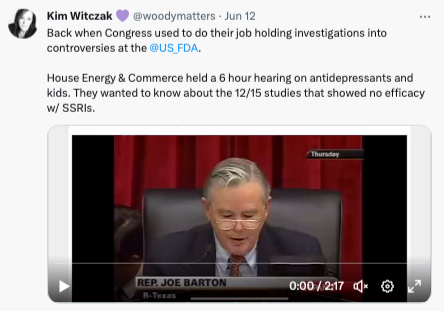September is Suicide Awareness Month
Looking Back on the History of Antidepressants Blackbox Suicide Warnings
September is Suicide Awareness month. It’s a time to pause and remember the lives lost to suicide as well as pay respect to the families who have endured this devastating and life changing loss. It's a club that no one wishes to be a part of, and tragically, it has far too many members.
Personally, I also want to acknowledge and honor the families that I met over the years, particularly during the early stages of my drug safety advocacy. Together, we grieved, shared our stories, and helped each other survive and make sense of this new reality of life without our loved ones. We became each other's lifelines, offering solace and strength in the face of our new reality.
Every September gives us an opportunity to call attention not just to suicide but also to the meds often used for mental health. With more and more people being prescribed antidepressants and the growing global mental health crisis, it's crucial to remind folks about the important safety issues and the checkered past of these medications. Antidepressants didn't always come with FDA black box suicide warnings like they do now.
Twenty years ago when my husband died of Zoloft-induced suicide, there were no warnings on antidepressants about the need to be closely monitored for changes when first going on antidepressants, changes in dosage, or coming off the drugs. We were completely blindsided and had to put the pieces together on what was long known about these medications. Although the information came too late for our family, I knew I needed to do whatever I could so no other family would ever have to learn the hard way, like we did. This became my God-given mission to share our family’s story and help get blackbox suicide warnings added to antidepressants. If just one life was saved, then Woody’s death was not in vain.
Antidepressants have a long legal and regulatory history and it always bears repeating. In 1991 when the FDA first held hearings on the emergence of violence and suicide with Prozac, I was fresh out of college just starting my first job in advertising. The FDA hearings on Prozac were not on my radar as it wasn’t relevant to my life.
Fast forward to 2003, when my husband was given Zoloft for insomnia I didn’t give the drug a second thought. Zoloft was heavily advertised and sold as “safe and effective.” Woody trusted his doctor and assumed the drug would help with his sleeplessness and certainly not harm him. We never once questioned the drug.
Looking back, I sure wish that I paid attention or was informed of the issues with antidepressants first raised in the 1991 FDA hearings. Woody would still be here today.
This is why I continue to tell Woody’s cautionary tale two decades later to raise awareness about the issues surrounding FDA blackbox suicide warnings and the controversies that led to their implementation in 2004 and 2006.
Many families may still be unaware about these historical occurrences, including the political and regulatory disputes, including congressional inquiries, surrounding the concealment of data regarding antidepressant-related suicides in children by both pharmaceutical companies and the FDA.
Stories and the Data: The Fusion of Head and Heart
Shortly after Woody's death, I had the opportunity to connect with other courageous families in Washington DC, and it became clear that I was not alone in my experiences. Our stories were eerily similar. Drawing upon my career in advertising, I understood the power of telling our personal and collective story to help drive meaningful change. It was important to share these heart-wrenching stories alongside data and research. I like to call it the "head and heart strategy."
Fortunately my lawyers at Baum Hedlund (now Wisner Baum) connected me with some of the foremost independent research and medical experts from around the globe who had been diligently working to uncover the risks associated with antidepressants for decades. This collaboration was nothing short of magical, as it brought together a group of dedicated individuals committed to sharing this important story and urging regulators, Congress, and the media to issue warnings about the link between antidepressants and suicide.
As a result of the 2003 warning from the UK's Medicines and Healthcare Regulatory Agency (MHRA) regarding the heightened risk of suicidal behaviors in children prescribed antidepressants, the FDA had no choice but to launch an investigation and hold public hearings to scrutinize the connection between these medications and suicides.
On October 15, 2004, after years of increasing evidence and public pressure, and likely influenced by Britain's prior action, the FDA finally acknowledged the connection between antidepressant drugs and suicide. In response, the FDA issued its most stringent warning, the black box warning, for all antidepressants.
However, the blackbox warning did not extend to adults. Consequently, public pressure persisted, compelling the FDA to once again examine the potential link between antidepressants and suicidal behavior in adult patients.
One would think that if the FDA was genuinely interested in addressing the issue of suicidality, they would have sought input from prominent independent critics, researchers and lawyers who have been actively engaged with this matter for over 15 years. But they didn’t and instead engaged conflicted industry researchers to conduct the meta analysis.
Instead, the leading independent experts like David Healy, Joseph Glenmullen, and Peter Breggin and the lawyers who had litigated antidepressant suicides cases were each given 3 minutes during the Open Public Hearing to present their data. This was the same amount of time families were given to tell their loved ones’ story. To this day, it has never made sense to me why the FDA wouldn’t be interested in hearing all sides of a safety issue.
Share (UN)Acceptable Collateral Damage
2006 Victims & Expert Press Briefings
This is why I joined forces with Vera Sharav at the Alliance for Human Research Protection to organize two press conferences in advance of the FDA hearings to brief the public and media on the issues. Presentations were made by Kim Witczak and Eric Swan, and by Vera Hassner Sharav, Joseph Glenmullen, MD, David Healy, MD, John Abramson, MD, David Cohen, Ph.D, and Karen Barth Menzies, Esq. of the legal firm Baum Hedlund.
The press release below includes important facts of the clinical issues and a body of evidence withheld from the FDA advisory committee. The FDA withheld all critical analyses, internal company documents that were now in the public domain, and all reports by outside independent experts—just as these same FDA officials had done in 1991 when FDA last discussed the adult SSRI suicidality data at a public hearing.
FDA’s concerted effort to limit and contain the discussion to a selective dataset that it alone has access to, is contrary to the scientific method. Thus, the reason we held this press briefing to shine a light on the issues.
2006 Press Conference Media Advisory on Antidepressants and Adult Suicidality
156KB ∙ PDF file
The Alliance for Human Research Protection and Woodymatters convened a press briefing at National Press Club day before the FDA Advisory Committee hearing on adult suicidality. Kim Witczak and her brother-in-law, Eric Swan, spoke on behalf of victim advocates for drug safety. It was followed by independent experts who reviewed scientific and clinical evidence, shedding light on what was known 20 years ago, and what is known and not known in 2006 about the safety and efficacy of antidepressant drugs.
DownloadBelow are video presentations from the world class experts, doctors, researchers, and attorneys. The information is as relevant today in 2023 as it was in 2006.
Kim Witczak, Victim Advocate, Co-Founder of Woodymatters
Vera Sharav, Alliance for Human Research Protection
Dr. Joseph Glenmullen
Part One - David Healy
Part Two - David Healy
Part Three - David Healy
Dr. John Abramson, Author of Overdosed America
Karen Barth Menzies, Attorney
Part One - David Cohen
Part Two - David Cohen
December 13, 2006 FDA Psychopharmacologic Drugs Advisory Committee Hearing
There were over 70 individuals and mental health/suicide prevention organizations and professionals who spoke during the Open Public Hearing. The comments ranged from “Antidepressants saved lives and afraid warnings will scare people from taking the drugs” to “Antidepressants destroyed our loved ones lives and pushed for warnings.” As you can imagine, emotions and tensions ran high. The room was standing room only and included an overflow room. Cameras from all the major news networks from around the world as well as armed security guards lined the room.
Here’s a funny story from the hearing… FDA's Bob Temple arrived late to the meeting, soaked from the rain, and walked in carrying a Pfizer umbrella. Truly unforgettable. I am sure he didn’t even think of the optics, but it wasn’t lost on the crowd.
Below are a few of the public testimonies that were captured by the media or film makers. I wish that the entire hearing was recorded, but this will give you a little taste. Again, these hearings took place at a time when there was no social media and FDA hearings were not recorded like they are today. (Note: David Cohen shared his brief personal impressionsand summary of Open Public Speaker comments from the December 13 meeting of the FDA’s Psychopharmacologic Drugs Advisory Committee as well as the press briefings.)
Mark & Cheryl Miller
Mary Ellen Winter & Family
Beverly Hatcher
Jayne Richner
Rosemary Dorsett
Ellen Hansen
Kim Witczak
Dr. Glenmullen
David Healy
Dr. Peter Breggin
Ultimately, the FDA extended the blackbox suicide warning to age 24. To this day, there are NO suicide warnings for adults despite FDA and drug companies knowing for decades that all ages are at risk. As I always say, how does the drug know you are 24 today but 25 tomorrow and no longer at risk? It makes no sense as well as creates the false narrative of being safe for adults.
If our genuine aim is to prevent suicides, then it is absolutely essential that this information is made widely available and openly discussed with patients of all ages and their families. There exists an entirely new generation that remains unaware of the risks and historical context of antidepressants. This is why news stories, like the one below from 2019, continue to be vital in maintaining public awareness on this critical and potentially life saving issue.
Two decades later, I still receive messages from families grappling with the pain of trying to understand their loved ones’ suicides. Their stories are profoundly heartbreaking, particularly as they uncover details about the medications in question. It is indefensible that this information remains inadequately discussed. That’s precisely why these stories and insights from over 20 years ago remain as pertinent and critical as ever.
Take the time to educate yourself and not just blindly trust like we did. It just might save you or your loved ones’ life.




No comments:
Post a Comment